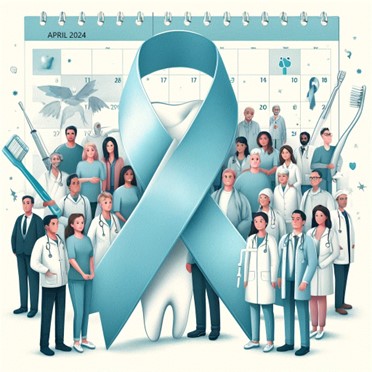
April is recognized as Oral Cancer Awareness Month, a crucial period dedicated to highlighting the importance of early detection, prevention, and the wide-reaching impact of oral cancer. This month serves as a reminder for individuals to pay attention to their oral health and to seek regular dental check-ups that can lead to the early detection of oral cancer, significantly improving survival rates.
Oral cancer refers to cancers found in the mouth, on the tongue, lips, inside the cheek, in the gums, in the roof and floor of the mouth, in the tonsils, and in the salivary glands. According to the American Cancer Society, tens of thousands of people are diagnosed with oral cancer each year in the United States alone, and the disease results in thousands of deaths annually.
Why Oral Cancer Awareness is Important
- Early Detection Saves Lives: Early detection of oral cancer significantly improves the chances of successful treatment. Regular dental check-ups are essential because dentists can often detect precancerous conditions in the mouth before they evolve into cancer.
- Raising Awareness: Many people are unaware of the risk factors and symptoms of oral cancer. Awareness campaigns during April educate the public on signs to watch for, such as sores that do not heal, unexplained bleeding, and persistent pain or numbness in the mouth.
- Understanding Risk Factors: Awareness months also serve to inform people about the risk factors associated with oral cancer, which include tobacco use, heavy alcohol consumption, excessive sun exposure to the lips, and the human papillomavirus (HPV).
- Promoting Healthy Lifestyles: By educating the public about the risk factors, Oral Cancer Awareness Month encourages individuals to adopt healthier lifestyles to reduce their risk of developing the disease. This includes quitting smoking, moderating alcohol consumption, using lip balm with SPF, and considering HPV vaccines.
- Support and Unity: This month also provides an opportunity for those affected by oral cancer to share their experiences, creating a community of support. It emphasizes that they are not alone and that there are resources and groups ready to provide assistance.
How to Participate
- Get Screened: Take this time to visit your dentist or healthcare provider for an oral cancer screening.
- Educate Yourself and Others: Learn about oral cancer, its risk factors, and symptoms. Share this information with friends, family, and on social media.
- Support Research and Survivors: Consider donating to organizations that support oral cancer research or help survivors and their families.
- Wear Light Blue: The light blue ribbon is the symbol of oral cancer awareness. Wearing it helps spread the message and shows support for those affected.
Oral Cancer Awareness Month is a collective effort aimed at reducing the incidence and mortality rates of oral cancer. By participating, you contribute to a larger movement that promotes oral health, supports survivors, and remembers those lost to the disease.
- Understand the oral cancer risk factors: Some risk factors for mouth cancer cannot be changed, but the biggest risk factors are lifestyle choices. Risk factors for oral cavity cancer include:
-
- Tobacco use, including cigarettes, cigars and all forms of smokeless tobacco
- Alcohol use, which multiplies the risk when used alongside tobacco
- Age, with people over 50 at a higher risk
- Gender, with oral cancer twice as common in men as in women
- Human papillomavirus (HPV), accounting for a small portion of oral cavity cancers
- Sun exposure, for oral cancer that develops on the outer lip
- Know the symptoms of mouth cancer: The most common symptom of oral cavity cancer is a mouth sore or lesion that does not heal and is white (where it should normally be pink). But a wide range of abnormalities can signal cancer, including:
-
- A white, red or black discoloration in the soft tissues
- A lump or hard spot in the tissue (usually at the edge of the tongue)
- A growth in the tissue that protrudes and may resemble the head of cauliflower
- Any mouth abnormality that bleeds easily when touched
A cancerous or precancerous ulcer is an actual change in the color of the mouth’s tissue, and not just a white coating (which may signal bacteria or infection). If a biopsy (tissue sample) of the ulcer shows that it’s precancerous (called leukoplakia), your doctor may offer treatment to prevent cancer from developing.
- Avoid or stop tobacco use: Tobacco use, both smoking and smokeless forms, is the top risk factor for oral cavity cancer. Certain forms of tobacco, such as cigars and chewing tobacco, do not affect the risk of lung cancer but greatly increase your chance of developing mouth cancer. Your primary care provider (PCP) can connect you with the resources you need to quit smoking or using tobacco. Keep in mind, even if you stopped using tobacco years ago, your risk for oral cancer may still be high. Discuss your health history with your doctor and don’t wait to get symptoms checked.
- Limit alcohol consumption: Your risk for oral cancer increases with the amount of alcohol you consume and, according to the American Cancer Society, multiplies by 30 times if you drink and smoke heavily.
- Check your mouth for signs of oral cancer: Oral cavity cancer is a very slow-developing and slow-progressing cancer. But if ulcers go unnoticed and routine health maintenance is ignored, cancer may present at a more advanced stage. Dr. Mendelsohn recommends that when you brush your teeth, take an extra few seconds after rinsing to check out your mouth in the mirror.
- See your dentist regularly: Dentists are required to do an oral cavity screening with every examination. Seeing your dentist every six to 12 months, as recommended by the American Dental Association, means you’ll have a full oral cancer screening at least once a year.
- Don’t wait to get symptoms checked out: Whenever you notice an abnormal sore or growth in your mouth, it’s best to have it looked at by a professional.
